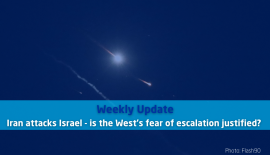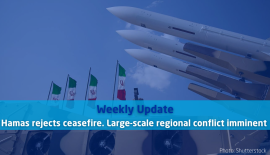Israel & Christians Today: Weekly Update (February 8)
The international geo-political landscape continues to change at amazing speed. Major shifts in political power, economic relations and religious influence combine to create new realities.
As always, Israel is at the centre of this storm.
Let us continue to pray for God’s ongoing protection for His people, for for the Peace of Jerusalem.
Let us also pray:
– for the Church: that the spiritual eyes of the Church will be opened, and
– for the leaders of our nations: they they will have the courage to adopt a positive attitude towards Israel.
In this update:
- Elections in Israel
- Pope visits the Middle East
- Israel’s strategic challenges
- The Jews of Venezuela
- The deep connection between the PLO and Iranian regime
Elections in Israel – who will lead the nation?
In the run-up to the elections in April, Israel is in the midst of a complex political landscape that is changing by the day. Likud has no guarantee of victory, and its traditional rival Labor is falling apart, as new parties are jostling for power. The position of PM Netanyahu, who is facing the possibility of indictment on charges of corruption, is far from clear.
Israel faces enormous challenges in the coming years, both external (growing threat of Iran, growing unrest in Gaza and the West Bank, increasing international pressure on Israel) and internal (huge economic challenges, integration of Ethiopian Jews, much division between orthodox, traditional, secular Jews, etc). There is a great need for clear and strong leadership.
Let us pray that God will continue to have His hand over His people and will enable the right men and women to be elected to lead the nation into an uncertain and challenging future.
Pope visits Middle East
Pope Francis has just finished an intensive visit to the Middle East, including the first visit by a Pope to the Arabian Peninsular. His tour concluded with visits to Jordan, the Palestinian Territories and Israel. Again, this tour demonstrates that the Pope is no ally of Israel and the Jewish people.
The Pope – who is the “Bishop of Rome” and head of the Catholic Church – is also both Head of the Holy See and ruler of the Vatican City State. He is thus BOTH a religious and political leader. His words and actions influence the foreign policy of many nations, and affect the attitudes of millions of people throughout the world towards Israel and the Jewish people.
The Holy See, although not a state, is a recognised sovereign actor under international law, and enters into treaties and diplomatic relations with states. The Holy See is a non-state observer in the United Nations.
The Holy See has always had a troubled relationship with Israel. Pope Pius XII (1939-1958) opposed the creation of the state of Israel in Palestine, on theological grounds. Since its establishment in 1948, Israel has exerted sovereignty over all holy sites within Israel. For decades, this was unacceptable for the Vatican which resented Israel’s claims to effective authority by denying it diplomatic relations.The Holy See did not even recognise the existence of Israel until 1993.
The Holy See has recognised the “State of Palestine” and maintains special relations with the PLO. The 2015 Agreement between the Holy See and “the State of Palestine” expresses support for Palestinian aspirations of independence by recognizing a “State of Palestine” that consists of all the West Bank and the Gaza Strip, including East Jerusalem.
Strategic Survey Israel 2018-2019
The Israeli Institute for National Security Studies (INSS) recently published its annual survey of Israel’s key strategic challenges and opportunities. The report is a fascinating read. It shows that notwithstanding the fact Israel is an open democracy and one of the most successful economies in the world, it continues to face real and immediate challenges that threaten its very existence.
The INSS report confirms what we have been reporting in recent weeks – by far the most significant immediate and medium term threat to Israel remains the influence of Iran in Syria (via its alliance with the Assad regime and Russia) and Lebanon (via Hezbollah), in conjunction with the Iranian nuclear ambitions and Iran’s economic relations with other nations, including Europe.
The depleted Jewish community in Venezuela – waiting and hoping
Venezuela has been home to a Jewish community for some two hundred years. That community contributed to the fabric of Venezuelan society and was instrumental in the development of the country’s economy while also constructing its own communal infrastructure, including schools, synagogues, and community centres.
Venezuelan Jews are today scattered around the globe – in Israel Canada, the US and elsewhere. Florida and Costa Rica have been very popular places for Venezuelan Jews to find a new home. Panama, the Dominican Republic and Colombia are also common choices.
Since 1998 under the regime of President Hugo Chavez, the Jews were targets of anti-Semitism. The community shrank from 25,000 to about 6,000 today.
Today, in the midst of the current political and economic crisis facing the country, the Jews in Venezuela are hoping for a better future.
Let us pray for the Jews of Venezuela – that they will be protected and inspired by the Holy Spirit to return to Israel.
Essay: Arafat and the Ayatollahs
This fascinating essay by Tony Badran (published in Tablet Magazine) reveals the deep ties that have existed (and continue to exist) between the Palestinians and the radical Islamic regime in Iran.
Andrew Tucker is International Editor of our bi-monthly newspaper Israel & Christians Today. The goal of Israel & Christians Today is to help Christians to take God’s Word seriously, and study current events in the world in the context of the Bible. Click here to subscribe.





